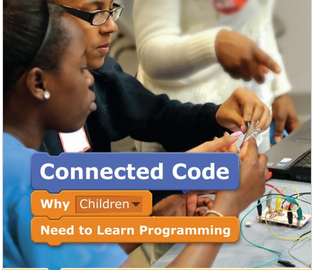about the book club!
This month, we will discuss why every child needs to learn to code and the ideas of computational thinking and computational participation.
About this Book
Coding, once considered an arcane craft practiced by solitary techies, is now recognized by educators and theorists as a crucial skill, even a new literacy, for all children. Programming is often promoted in K-12 schools as a way to encourage “computational thinking”—which has now become the umbrella term for understanding what computer science has to contribute to reasoning and communicating in an ever-increasingly digital world.
In Connected Code: Why Children Need to Learn Programming, Yasmin B. Kafai and Quinn Burke argue that although computational thinking represents an excellent starting point, the broader conception of “computational participation” better captures the twenty-first-century reality. Computational participation moves beyond the individual to focus on wider social networks and a DIY culture of digital “making.”
Kafai and Burke describe contemporary examples of computational participation: students who code not for the sake of coding but to create games, stories, and animations to share; the emergence of youth programming communities; the practices and ethical challenges of remixing (rather than starting from scratch); and the move beyond stationary screens to programmable toys, tools, and textiles.
(Note: The above information was quoted in the book “Connected Code”.)
About the Authors
Yasmin B. Kafai is a professor in the Graduate School of Education at the University of Pennsylvania. Her work promotes coding, crafting, and creativity across grades K–16.
Quinn Burke is a Senior Research Scientist in the Learning Sciences at Digital Promise. Quinn’s research examines the effectiveness of different coding activities by which to introduce computer science and computational thinking (CT) to students.
How to Participate
Over the next two months, we will have a slow twitter chat discussion of Connected Code by Yasmin Kafai and Quinn Burke. In this slowchat we will use #CIRCLedu to tag all questions. One set of questions will be released on April 8 and another set will be released on May 6. To join the discussion, please follow #CIRCLedu on Twitter and contact us if you have any questions!
NOTE: Please use A# as well as #CIRCLedu when answering questions. For example, when answering question1 (Q1) please use A1 before your answer. This might look like this:
Q1: This is the first question of the book club! Who all is out there? #CIRCLedu
A1: I can’t wait to get started! #CIRCLedu

